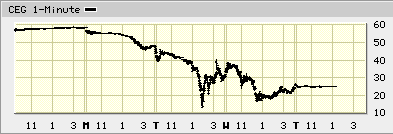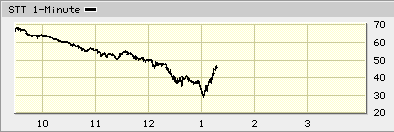Is "panic" too strong of a word to describe the markets in recent days? I don't think so. Consider a couple of examples outside of the investment banking space:
1) Constellation Energy (CEG)
My old utility company when I grew up in Baltimore, Constellation is the parent of Baltimore Gas & Electric. CEG gets 20% of their earnings from energy trading and had contracts with Lehman Brothers. Although CEG's net exposure to Lehman's bankruptcy was immaterial, investors panicked and sent the stock down from $60 last week to as low as $13 on Tuesday. Today Warren Buffett's 88% owned MidAmerican Energy agrees to buy CEG for $26.50 in cash, or about 75% of the company's book value, in a deal that alleviates counterparty concerns over CEG's liquidity.
2) State Street (STT)
State Street fetched $68 before 10:00 this morning and hit $29 shortly after 1:00pm. State Street is listed as a large holder of all the troubled financial stocks, which worried people, but STT is a custodian for their clients and index funds and does not own the vast majority of the stocks in question. They simply act as custodian and collect fees for doing so. STT issued a press release this afternoon trying to clear things up and assured investors their money market funds had not dropped below $1 in NAV.
There is no doubt in my mind that we are simply in the midst of a worldwide financial panic. The UK just restricted all short selling in financial stocks until the dust settles. Fear and mostly unsubstantiated rumors are driving price action right now.
So what should an investor do in this environment? It might surprise you, but I have been making very few moves during all of this craziness. Trading when fear, panic, and rumors have taken over doesn't make much sense because prices are not based on reality but rather perception. Lack of confidence and uncertainty about what is true and what is not is a deadly combination for financial markets and many firms. It doesn't matter if Morgan Stanley (MS) is not in trouble. If clients think they might not be, they will pull their money and set off a "run on the bank"scenario. That very situation will likely forced them to sell the company in the heart of the panic, regardless of what the reality is.
As long as you know and understand what you own and have done adequate fundamental analysis, I would suggest standing pat and waiting for things to settle down. Like LTCM, the Asian financial crisis and every other financial market panic, this one too will be over at some point. When that happens we can get back to good ol' fundamental investing. Fortunately, most of the people reading this blog, as well as myself and my clients, can wait for the storm to pass.
Full Disclosure: No positions in any of the companies mentioned at the time of writing


